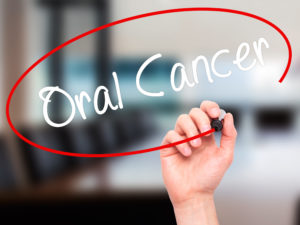
More than 50,000 people in the United States are diagnosed with oral cancer each year, and nearly 10,000 people die from it. Sadly, though, oral cancer does not get the attention it deserves. Many people even wrongly conclude that they are not at risk for it! Let’s talk about some of the primary risk factors for oral cancer and what steps you can take to protect yourself from it.
Tobacco Usage
Tobacco usage in any form is the greatest contributing factor to the development of oral cancer. In fact, about 85% of oral cancer cases are linked to tobacco! Cigarettes, cigars, pipes, and chewing tobacco are all extremely dangerous. Also, you should never underestimate the risks associated with secondhand smoke; it may significantly increase the risk of head and neck cancer.
What you can do: If you smoke, work with your general care practitioner to find a quit plan that works for you. You may have to make several attempts to quit before you succeed, but all of your efforts will be worth it!
Heavy Alcohol Consumption
In moderation, alcohol poses very few health risks. In fact, there is research to suggest that red wine might even help to fight cancer. However, frequent and heavy alcohol consumption, especially when combined with smoking, can significantly contribute to the risk of developing oral cancer.
What you can do: It is generally recommended that men have no more than two alcoholic drinks per day, while women should limit themselves to one drink per day.
HPV
The human papilloma virus (HPV) is the most common sexually transmitted disease. Many people who have it do not experience any symptoms, which makes it easy to spread between partners. Certain strains of the virus are associated with a heightened risk of oral cancer.
What you can do: HPV vaccinations are recommended for all preteen boys and girls. If you never received a vaccination, you can keep your risk to a minimum by limiting high-risk behaviors.
Prolonged Sun Exposure
Spending too much time in the sun’s ultraviolet light can lead to a higher risk of lip cancer, especially in individuals with fair skin.
What you can do: Make it a practice to wear a lip balm with SPF. Wearing a hat and limiting the amount of time you spend in direct sunlight can also help to keep your exposure to UV rays to a minimum.
Are You at Risk?
The abovementioned factors are just some things that can contribute to oral cancer. Additional risk factors include older age, being male, poor nutrition, and a weakened immune system. Really, though, anyone could develop this devastating disease. That is why attending regular screenings with a dental professional is so important. Catching the disease as early as possible can increase the chances of survival and reduce the need for extensive or invasive treatments.
You should never assume that oral cancer is an impossibility for you. Taking steps to minimize your risk could save your life!
Meet the Practice
The doctors at Piney Point Oral and Maxillofacial Surgery routinely perform oral cancer screenings for patients. They also partner with oncologists to perform oral cancer surgery when necessary. To learn more about oral cancer and how we can help you identify and fight it, contact us at 713-783-5560.

